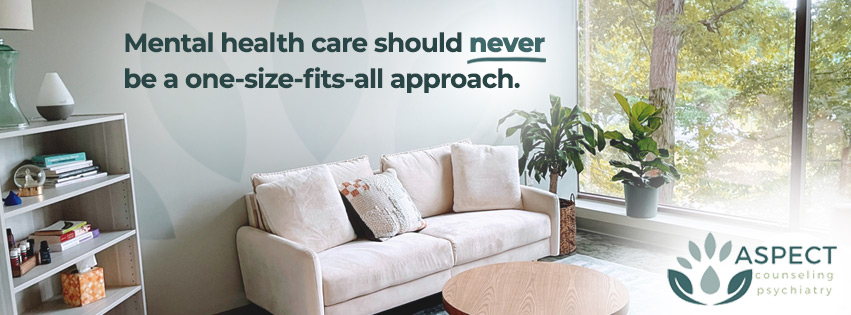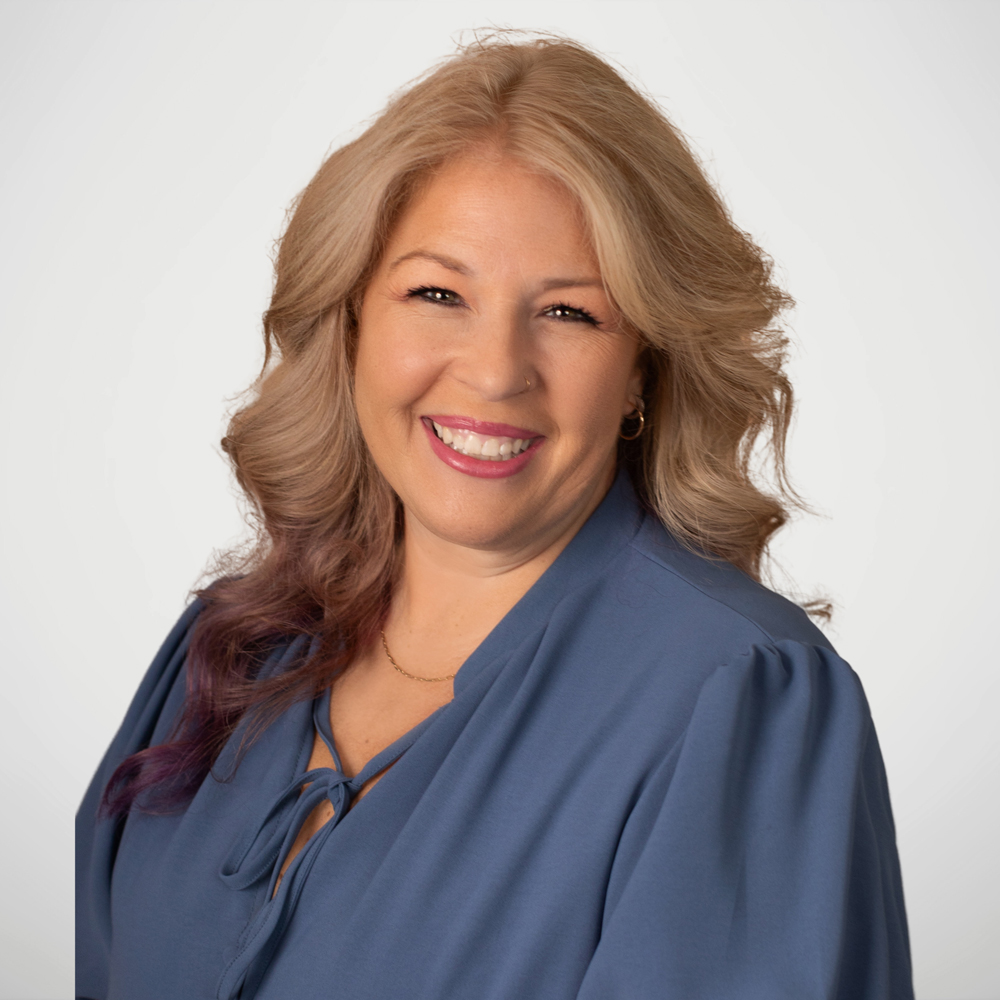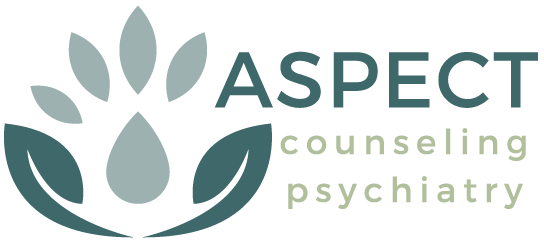If you’re looking for OCD therapists in Richmond, VA, you have come to the right place. Our licensed therapists are here to help.
At Aspect Counseling and Psychiatry, we have therapists & board-certified nurse practitioners to provide a continuity of care that most therapy practices don’t provide.

- We’re available for in-person OCD therapy in Richmond, VA, as well as telehealth sessions throughout Virginia
- We have over a dozen therapists & nurse practitioners (PMHNPs) who treat OCD in a variety of ways
- We never take a one-size-fits-all approach; every client is unique
- Our PMHNPs work alongside our OCD therapists to help diagnose conditions, run tests, and prescribe medication, if needed
If you’re still curious how an OCD therapist might be able to help, let’s talk about what OCD is, the types of therapy we use to treat it, and how our team can help you manage your symptoms.
- What is OCD?
- How Our OCD Therapists Can Help
- OCD Treatments Near You
- OCD Therapists in Richmond, VA
- OCD Psychiatric Providers in Richmond, VA
- What to Expect During a Session
- FAQs Related to OCD and Therapy
- Our Therapy Office
- Get Help From OCD Therapists Today
What is OCD?
Obsessive-Compulsive Disorder (OCD) is a mental health condition that causes persistent, unwanted thoughts (obsessions) and repetitive behaviors (compulsions). These symptoms can interfere with daily life, relationships, work, and overall well-being.
Common examples include excessive cleaning, constant checking, or intrusive fears. The good news is that OCD is treatable. With the right therapy, people often experience significant relief.
How Our OCD Therapists Can Help
Our licensed OCD specialists in Richmond, VA provide compassionate, evidence-based care designed to reduce symptoms and improve quality of life. Whether you’re struggling with severe OCD or milder symptoms, our team will:
- Create a personalized treatment plan tailored to your needs
- Offer proven therapies like ERP and traditional CBT
- Teach coping strategies to reduce compulsions and manage obsessive thoughts
- Provide a safe, judgment-free space to explore challenges and build resilience
If you’re searching for “OCD therapy near me” or want a trusted team of OCD therapists, we’re here to help.
OCD Treatments Near You
OCD treatment typically involves a combination of psychotherapy, skills training, and sometimes medication. Some of the most effective therapy approaches include:
Cognitive Behavioral Therapy (CBT)
Helps identify and reframe negative thought patterns.
Exposure and Response Prevention (ERP)
Reduces compulsions by gradually facing fears.
Acceptance and Commitment Therapy (ACT)
Teaches mindfulness and acceptance strategies.
Medication Management
In some cases, psychiatrists or PMHNPs may prescribe SSRIs or other medications as part of a broader treatment plan.
Eye Movement Desensitization and Reprocessing (EMDR)
Helps identify and reprocess memories and events that contribute to the symptoms of OCD.
CBT for OCD
CBT therapy for OCD focuses on challenging the thought patterns that fuel obsessive fears and compulsive behaviors. With the support of a trained therapist, clients learn healthier ways to respond to intrusive thoughts. CBT is one of the most researched and effective approaches for long-term OCD recovery.
ERP for OCD
ERP treatment is widely recognized as the gold standard for OCD therapy. This process involves gradually exposing clients to the thoughts, images, or situations that trigger their anxiety—without engaging in compulsive behaviors. Over time, this helps retrain the brain, reducing fear and breaking the cycle of obsessions and compulsions.
Our ERP specialists in Richmond will walk you through it step by step.
OCD Therapists in Richmond, VA
Here’s a list of our therapists who specialize in working with clients that have OCD.

Amber Zarger
LCSW

Carla Crews
LCSW

Gabby Scalzo
PhD, LCP
Hunter Worsham
LPC

Josh Barefoot
LPC

Kristina Gilbert
LPC

Laurie Manns
LPC, CSAC

Lindsey Bowers
LPC

Mikeyda Travers
LPC

Robyn D’Reaux-Rodgers
LCSW

Shenika Whitaker-Carlos
LCSW, CSOTP
OCD Psychiatric Providers in Richmond, VA
For some clients, a psychiatrist or psychiatric mental health nurse practitioner (PMHNP) may be part of your care team. They can do a few things that therapists cannot. PMHNPs can:
- Provide an official OCD diagnosis
- Prescribe medications (such as SSRIs), when appropriate
Our practice employs both therapists and psychiatrists, working together, to ensure you receive the most effective & holistic treatment possible.
Select one of our board-certified psychiatric nurse practitioners below to learn more about them and their involvement in treating OCD.

Allison Ernest
PMHNP-BC, RN, MSN

Elizabeth Markey
PMHNP-BC, MSN, CNM, PMH-C

Jennifer Peele
PMHNP, FNP-BC, APRN

Jonathan Yoder
PMHNP-BC

Leigh Carter
PMHNP-BC, RN, MSN

Ryan Ernest
PMHNP-BC
What to Expect During a Session
Every OCD therapy session is unique, but you can generally expect:
- A welcoming environment where you can share openly
- A structured approach that may include CBT, ERP, or both
- Practical tools and strategies to practice outside of sessions
- Gradual progress, with measurable improvements over time
Our therapists prioritize both comfort and results—helping you and/or your children to take steps toward freedom from OCD.
FAQs Related to OCD and Therapy
You might find these helpful if you’re just getting started and want to learn more about OCD therapy at our office in Richmond.
Many clients begin noticing improvements within 12–20 sessions, though long-term results vary depending on severity.
Yes. Our office accepts many forms of insurance, including medicare. Check our insurance page for a complete list of insurance providers.
OCD rarely resolves without treatment. Professional therapy gives you the tools needed for lasting recovery.
Yes, we provide OCD therapy for both adults and adolescents in Richmond, VA.
ERP can feel challenging at first, but it’s highly effective. Our therapists guide you with compassion and allow space for you to progress at your own pace.
Our Therapy Office
Our therapy office is located in the heart of West End Richmond, in the Innsbrook business complex—at the crossroads of I-64, I-295, Hwy 288, and West Broad St. We share the Liberty Plaza I building with several law offices, financial services companies, and other Richmond-area businesses, at the corner of Cox Rd. & North Park Dr.
4801 Cox Road, Suite 205
Glen Allen, VA 23060
Directions →

Get Help From OCD Therapists Today
If you’ve been searching for OCD therapists near you who provide treatment in Richmond, VA, our team is here to support you.
Whether through CBT, ERP, ACT, or a more customized treatment program, we’ll help you take back control and move forward with confidence.
Call us today or use the button below to schedule your first session.
